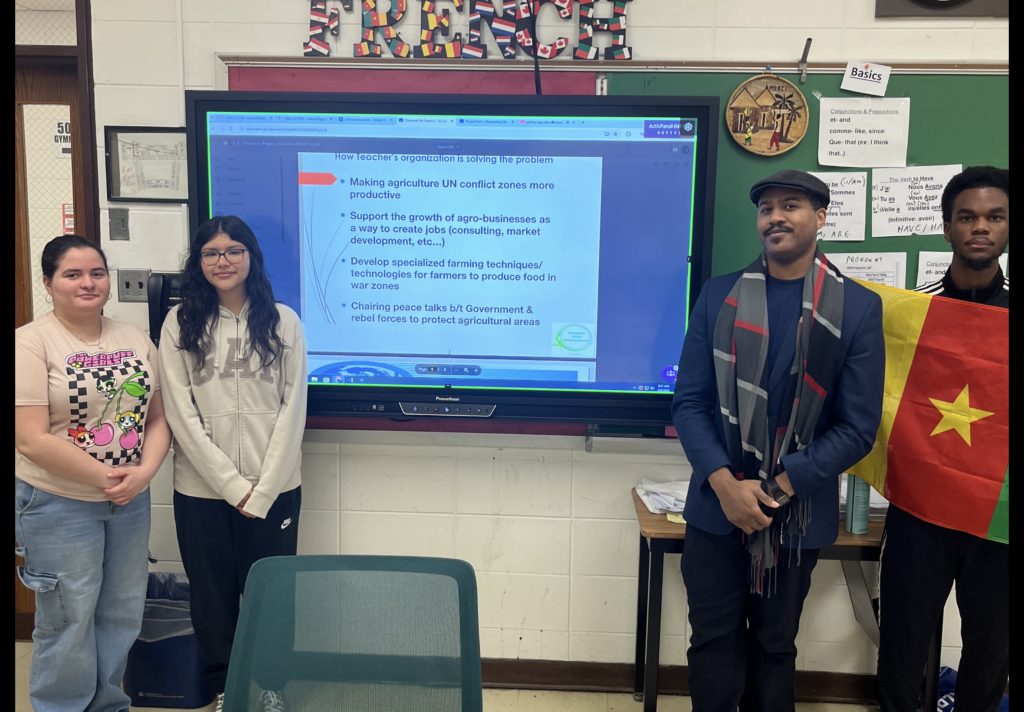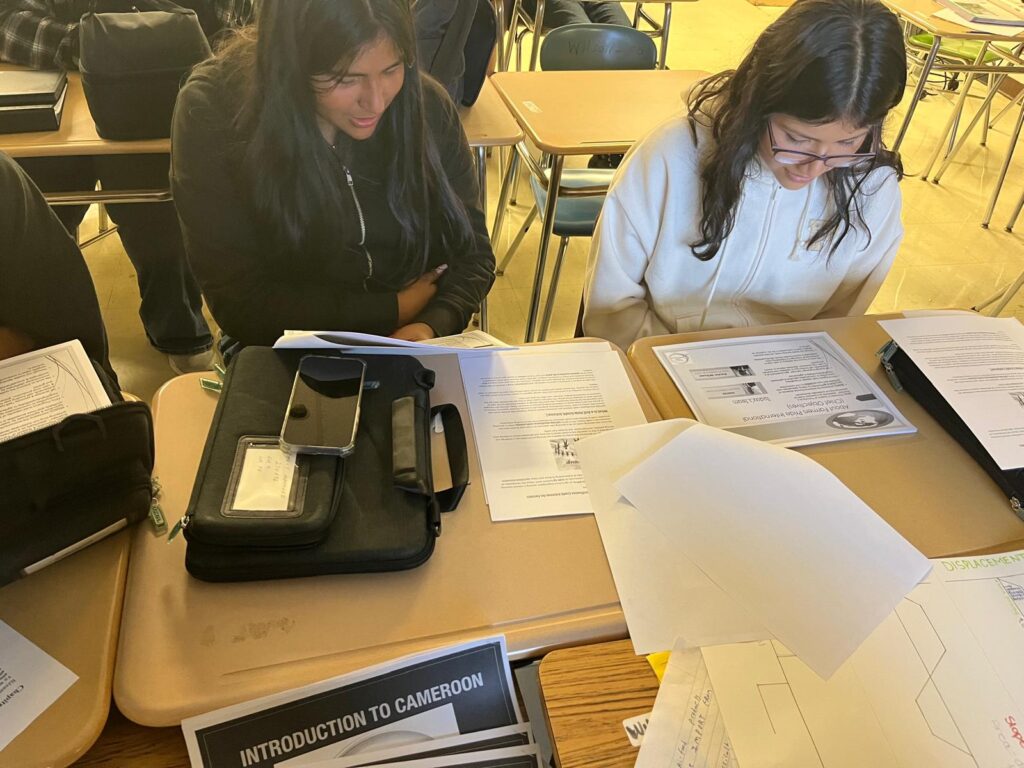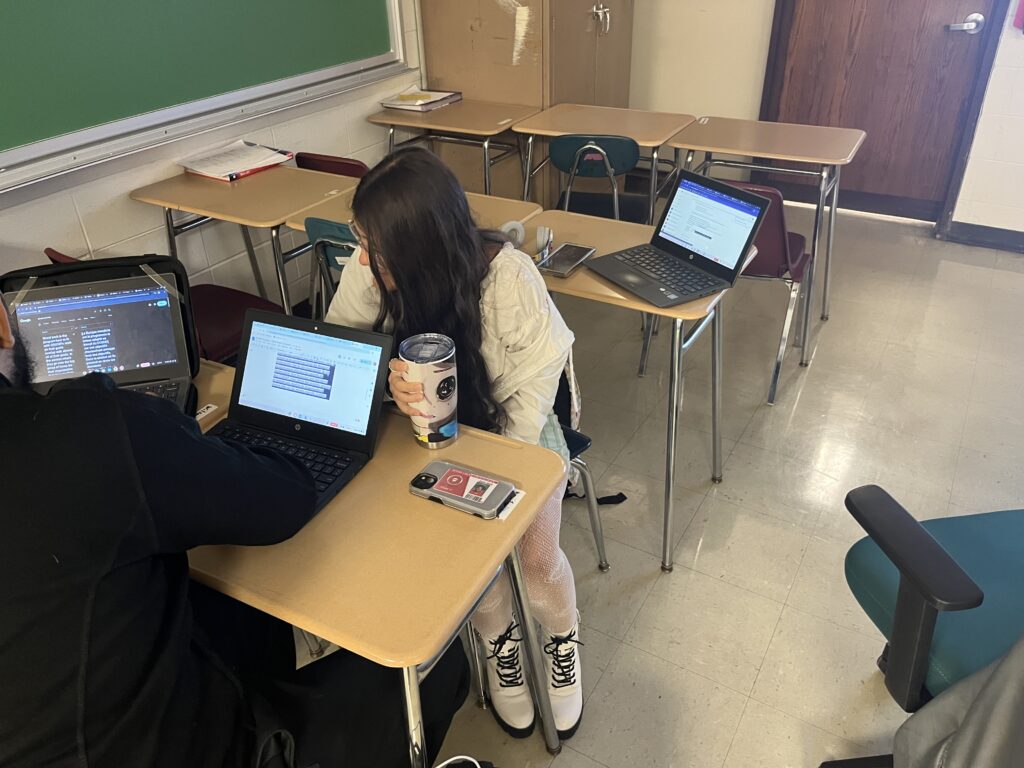Kevin Wilson, Penn Grove HS Students Make Difference in Cameroon

Mr. Wilson & his French II students read/discuss a situation briefing by FPI’s local coordinators in Buea, Cameroon on how the war is affecting food security in the contested regions. Photo courtesy of Kevin Wilson.
BY NATALIE ARCH | For AC JosepH Media
CARNEYS POINT — At Penns Grove High School, Kevin Wilson has integrated a way to teach his students how to speak French while simultaneously educating them on the crises in Cameroon, a country in west-central Africa, off the Gulf of Guinea.
Wilson, a teacher for 10 years, teaches introductory French all the way to the advanced level, freshman through senior year. Wilson was given the opportunity to develop a program for the district involving project-based learning and wanted to focus on the real-world value it has for his students.
“I think we’ve all been in a class before thinking to ourselves that there isn’t necessarily a value with what we’re being taught as it relates to the real world. I quickly decided that would not be my class,” said Wilson.
His goal as a teacher was for students to leave his class with college and career readiness skills as well as the skill to potentially solve real-world problems.
Before becoming a teacher, Wilson led multiple large, non-profit organizations that served countries all over the world, such as the Millenial Legacy Foundation, which served countries such as Kenya, Uganda, and parts of Tanzania.
“We actually worked in partnership with the U.S. State Department to try and facilitate economic development through entrepreneurship, so we ran a series of startup incubators full of entrepreneurs,” said Wilson.


The work being done by Wilson and the non-profit organizations was being primarily discussed in French, which gave him the idea to use that same method with his students.
“If you’re learning entrepreneurship, or martial arts for example, you want somebody who not just read the material, but who has the experience of praxis, because disciplines evolve,” said Wilson.
Cameroon was the chosen subject of this project based on a number of issues, but mainly on their current conflicts, the fact that they are a French-speaking country, and that there is room for his students to make a genuine and positive impact.
“Cameroon has been going through a period of conflict, essentially a silent Civil War, since approximately 2018,” said Wilson.
The conflicts revolve around food security, economic and business factors, and political rights and representation — which directly correspond with chapters written into their curriculum.
“There’s a lot of room for interdisciplinary interventions, so students engaged at the margins, at least in algebra coursework in some of our agricultural science courses,” said Wilson.
The conflict lies between Northwest and Southwest Cameroon, and then the rest of the Republic of Cameroon regarding the main language they speak, food security, and political representation.
In 2016, Northwest and Southwest Cameroon, which are largely French speaking, had made moves to break away from the rest of the country which is English speaking.
“This gave us a revolutionary movement to essentially develop a new sovereign, independent republic. Of course, the problem was, the break wasn’t clean or easy and there remained conflict,” said Wilson.
The fighting between each area is causing the government on both sides to enforce lockdowns. These lockdowns prohibit citizens from making a living wage to support themselves and their families.
“If you’re just a regular person, you’re not involved in politics, right? You’re just trying to feed your family, make a living, unless you have both sides enforcing protocols that restrict your ability to operate a business, that restricts your ability to go to your farm, that restricts your ability to honestly do anything,” said Wilson.
The lockdowns are unpredictable and can sometimes last up to weeks or months — which was frequent in 2023 and 2024. Wilson’s organization, Farmer’s Pride International, was already in both areas. In the past, Wilson and his students helped operate programs within Cameroon.
“We actually had a very innovative program where business owners in the community, farmers, would come together, they would pool their savings and their profits and use it to make strategic investments,” said Wilson.
Now, during the current curriculum, Wilson wanted to create a strategy to help the citizens affected by the unpredictable and lengthy lockdowns across the area. Going from there, Wilson’s students developed and outlined a program that taught farmers how to create their own home-based systems.
“If I’m under lockdown, I’m punished or threatened if I leave my property. If I stay on my property, then I can still feed my family, I can still turn this into a business,” said Wilson.
Unfortunately, the limits of the lockdowns are not the only challenge that the citizens of Cameroon are facing. The security protocols are damaging the economy and causing mass starvation.
Wilson said he wanted to build something called “neutral zones” around their projects to eliminate issues that farmers were facing due to the fighting from both regions.
“My goal for this year was to have both sides agree that we’re not going to touch the agriculture projects,” said Wilson.
Students then drafted preliminary memos regarding protecting agriculture that was then presented in the diplomatic form. Organizations would apply to work with Wilson and his students to then lead these peace talks in hopes to create the neutral zones.
“I can point out that we were successful in this goal, actually, which is the reason why we though that story needed to be told, because while the broader conflict rages on and on, the fact is that those neutral zones have been established in the Northwest regions where there’s conflict,” said Wilson, “So farmers can go about their business, people are no longer in want of food, and they’re able to produce, grow, sell, and profit.”
Wilson noted that the support of Penns Grove High School administration helped move the project along.
“It is easier because they [the students] have an administration that’s very supportive of that kind of innovation. They’d like to see their students succeed,” said Wilson.
The success of his students and creating a vehicle for them to become successful was a priority to Wilson throughout this whole project. He wanted to make sure they felt confident and prepared to make a real change in their world.
“Our young people have wonderful ideas when we give them the preparation and the chance to contribute to the world’s challenges, what they often lack is, one, the institutional empowerment and two, the personal wherewithal,” said Wilson.
Wilson had made a point to emphasize the effort and dedication put in by his students in every grade he teaches.
“I’d love to praise the students for the dedication that they’ve put in for a cause that they may not have first expected, but they rose to the challenge,” said Wilson.
Students at Penns Grove High School will continue to work tirelessly to ease conflicts in places like Cameroon, while over the summer, Wilson will travel to new places to discover where else can his students make a difference.
Follow Us Today On:
Note from AC JosepH Media: If you like this story and others posted on Front Runner New Jersey.com, lend us a hand so we can keep producing articles like these for New Jersey and the world to see. Click on SUPPORT FRNJ and make a contribution that will go directly in making more stories like this available. Thank you for reading!





